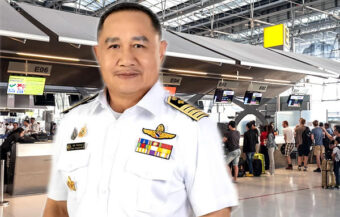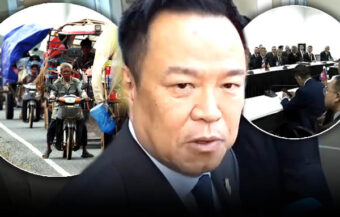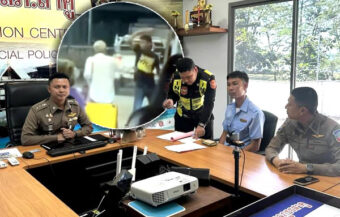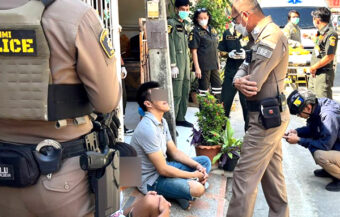Australian family packs up and moves to Phuket as sky-high rents push them out of Sydney. Natalie, 45, and Fred, 60, escape to Thailand for a more affordable life. They embrace freedom but acknowledge risks while building their million-dollar dream home.
A middle-aged Australian couple have fled Down Under to live in Phuket. The couple decided to make the move after the prospect of owning their own home appeared to disappear, driven by sky-high rents. Forty-five-year-old Natalie Coulson and her 60-year-old partner Fred, however, have discovered something in Thailand that is missing in Australia. She described it as a sense of freedom or a reminder of something lost from 1980s Australia. Whatever it is, the couple have embarked on what they admit is a ‘risky’ adventure. They have already invested in a million-dollar home in Phuket and are renting while it is being built. In the meantime, the pair are working diligently to make their life in the kingdom a success.
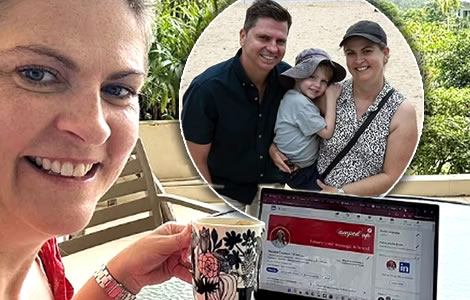
An Australian mother this week explained her reasons for moving with her family to start a new life in Phuket. Indeed, Natalie Coulson’s story was quite similar to a UK woman who also moved to the kingdom this year.
In May, Jessica Ward from Cheshire talked about taking flight from the United Kingdom with her family to avoid what she described as a ‘cost of living crisis’ there. Certainly, she also settled in Phuket with her partner and child. This week, the story is subtly different.
Forty-five-year-old Natalie Coulson and her 60-year-old partner, Fred, are moving away due to skyrocketing property prices in Sydney. The couple had been living in Manly, a suburb in northern Sydney, with their five-year-old son. In short, their rent was $1,295 a week for a duplex.
Natalie and Fred moved to Phuket to realise their dream of homeownership acquired through longterm leasehold
The Australian couple moved here so that their dream of owning their own home could be a reality.
Of course, it comes as a long-term lease. “The only thing here is you don’t technically own the land,” she told the UK’s Daily Mail this week. “You lease the land and buy the house, but it’s the way things are done here, and houses are bought and sold under this structure.”
At the same time, Natalie reports that the pair have already bought the four-bedroom house in Phuket.
The price was Aus $1.2 million. Presently, they are living in a high-end gated community, in a large luxury home with three king-sized bedrooms and a swimming pool for $920 a week.
In the meantime, their dream home is being built from plan in a much sought-after enclave on the holiday island.
Natalie admits moving to Thailand was risky, but rising property rents in Australia drove the couple’s move
Natalie, who has a background working for the government, particularly the New South Wales state authority, admits that the move to Thailand is ‘risky’.
However, she told the Femail section of the Daily Mail that continuing to live in Sydney, with sky-high rents, presented an even bigger risk for the couple. Nonetheless, the couple may have been premature.
At length, it appears that property prices in Australia may indeed be falling. In September, 30% of Australian suburbs reported falling prices. For instance, in Melbourne, prices are decreasing in 80% of suburbs.
Indeed, Perth is the only state capital where prices are still on the rise. Certainly, Sydney property prices are moving downward. Figures from CoreLogic data suggest that prices in September were lower in 26% of suburbs surveyed.
Despite high rent, Natalie highlights savings in Thailand, where daily life is more affordable than in Sydney
At this time, Natalie runs her own marketing consultancy online. Certainly, she was forced to give up her government job in Australia.
The couple simply packed up their belongings, sent them to Thailand, and moved to a new home, new life, and what seemed like an exotic adventure. Despite paying what is, by Thai standards, an extraordinarily high rent, Natalie still emphasises that the family is saving money in Thailand.
The cost of shopping is $30-$50 a week. The family eats at modestly priced Thai restaurants daily, where lunch can cost as little as $2. Natalie explained to Australian readers just what it feels like to be living in Thailand.
In particular, she highlights the contrast in scenery. One minute she is at a restaurant surrounded by shack dwellings and people eking out an existence. However, the same night, she can be at a high-end cosmopolitan cocktail bar that would put anything in Sydney to shame.
Or, for instance, the high-end hotels in Phuket with their expensive surroundings, compared to the accommodation of poorer people on the island. Certainly, what she is pointing to is Thailand’s extreme inequality.
Lower living costs and taxation make Thailand a paradise for the couple, despite plans to snare foreigners in tax net
However, for the Australian couple, who appear to have savings and ongoing income, Thailand is a veritable paradise. The country has lower overheads, a relaxed lifestyle and significantly lower taxation.
Certainly, even with plans to include all foreigners in the Thai tax net over the coming years and despite the controversy over this, taxes in Thailand are cheaper.
Indeed, the former government employee in her interview this week described Australia as a ‘nanny state’.
Undoubtedly, it is a similar sentiment felt by many people when they first come to Thailand. Whether it be because of the country’s unfortunate history of coup d’états or political instability, the lack of development has preserved something fundamentally important that is being lost in developed societies.
“Australia has become such a nanny state, and Phuket feels more like the Australia I remember from the 1980s, but with modern technology.”
Natalie and Fred embrace risks as they set up a new life in Thailand, prompted by Sydney’s housing market
Indeed, Ms. Coulson, in her candid, honest appraisal of her situation, stumbles upon something intrinsically important.
She explained that perhaps the couple may have been happy over the next 10 years living in Manly, Sydney. After all, it was only 10 minutes from the beach. However, something did not feel right.
“We could have happily stayed a few years longer,” Natalie explained at length. Manly is a suburb in northern Sydney. “But our move was more about setting ourselves up for the next 10 or so years, and Sydney didn’t feel in sync with our long-term vision.”
Finally, she revealed the trigger for their Sydney move. The pair had been renting a property in the New South Wales capital, but the landlord wanted it back.
Suddenly, not being on the property ladder exposed their vulnerability. “We had been renting in Sydney, and the owners were moving back in, so once we agreed on the dates, moving out was pretty easy,” Natalie says.
The answer was Phuket. Ms. Coulson also reasoned that it was time in their life to do something different. “Life is short. It involves ‘crazy’ risks,” she declared this week.
The experienced couple continue working online, encouraged by Thailand’s incentives for foreign expats
At the same time, the couple is under no illusions. Natalie still works online for clients in Australia. Her partner, Fred, is presently doing an online marketing course.
Afterwards, he plans to launch an Asia-centric online business. This couple, who are investing in Thailand, are the poster child for the government’s visa incentives.
UK mother takes her family to live in Thailand to escape her own country’s cost of living crisis
Thailand’s July 15th visa revolution offers radical benefits for travellers to and from the Kingdom, with more to come
In short, efforts to attract both wealth and talent to the kingdom. However, they must make it work and make ends meet. The pair employ a nanny who takes care of their son for $10 an hour, while they have a team of maids who come in for an hour daily at $6 an hour.
Meanwhile, Alex is attending Phuket International School. At the same time, Mum and Dad build a new life for the family online.
“Fred had been working as a business analyst but left at the end of 2023 to take a marketing course and prepare for our move. He has cut career ties with Australia and is currently upskilling and preparing to launch a new Asia-based business,” Natalie explains. “My business is based in Sydney, so I am continuing to work with Australian clients. However, I had to leave my Government role, which was a shame as it was mostly remote and very doable from Thailand.”
Natalie appreciates Thailand’s freedom and affordability while acknowledging challenges like the language barrier
At the same time, Natalie echoes so many other expats in Thailand when she speaks about the sense of freedom to be found in the Kingdom.
Of course, there is also the warm weather and still a lower cost of living. “Taxes are way lower here, and huge value is placed on freedom,” she outlines. “We’re definitely noticing we can eat out for far less, and we’ve saved on our grocery shops for sure, so I’m sure we will notice the savings more over time.”
Moreover, Natalie is also aware of the need to form a stronger connection with local people in Phuket. In brief, she has begun to pick up Thai, even if right now only building up a vocabulary of words.
Notably, she says Thai people appreciate it, while at the same time, they often reply in English. However, there is certainly a language barrier. Furthermore, being able to speak English at length with friends freely is something she already misses from home in Australia.
The contrast in lifestyle between Phuket’s wealth and poverty is stark. Natalie advises others to think carefully
Thereafter, there’s that compelling strangeness of the contrasts in Phuket.
“You might also be eating a $2 meal in a simple Thai restaurant for lunch and then having cocktails later at a swanky bar that night. It doesn’t feel like you’re in the same place.”
Nonetheless, the small family is aware of the challenges that lie ahead.
There is so much anecdotal evidence, for instance, of corruption and inequality in Thailand, which, while part of the ‘freedom,’ after a while, gets to the sensibilities of those raised in Western societies.
Perhaps this is why the 45-year-old advises young Australians not to immediately jump on a plane to Thailand. In brief, she recommends looking at their own backyard first.
Ms. Coulson only suggests Thailand for those willing to take a risk—someone looking for something more colourful.
“If cost and getting out of a challenging housing market is the motivation, I’d suggest checking out a smaller city or town before heading overseas. Unless you’re really keen to travel and give life in another country a go,” she sincerely advises. “If living in Asia sounds like it ticks all of the boxes for someone, I’d recommend visiting and imagining yourself living there, not just being on holiday.”
Join the Thai News forum, follow Thai Examiner on Facebook here
Receive all our stories as they come out on Telegram here
Follow Thai Examiner here
Further reading:
UK mother takes her family to live in Thailand to escape her own country’s cost of living crisis
New tax era in Thailand begins as Revenue now shares data with 138 countries within the OECD
Calls for clarification of new Tax regime which appears to target expat foreign income sources
10 year visa a magnet for global citizens setting up in Thailand with zero tax on offshore income
Wealthy foreigners to own small landholdings associated with homes here agreed in principle
New plan for the Thai economy could see an elite foreign visa scheme generate up to 6% of GDP
Economic plan to put the smile back in Thailand’s appeal to western foreigners to live and work




